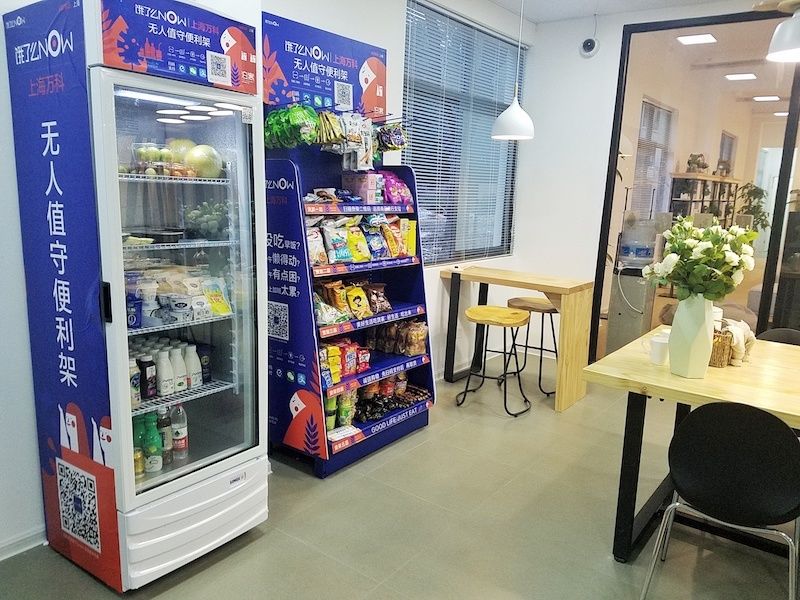Unmanned shelves are no longer in the limelight, is this the opportunity that "big guy" Ele.me finally got?
In just half a year, from the limelight in the capital markets to the frequent news of bankruptcy, withdrawal, and acquisition. The start-up company in the field of office unmanned shelves does not seem to have a good start in the spring of 2018.
The ability to circle a specific group of people in the office and their time is an important reason for companies that have made efforts in the field of unmanned shelves to bet on this track. But it turns out that the rhythm of point laying, offline BD, operation and maintenance of supply chain and logistics, any failure of any link, may frustrate this "not sexy" business in itself.
What is the attitude of large companies that have not moved much before? At least for now, a group of large companies that are ready to make efforts in the new retail field have not been deterred by the temporary chaos in the industry. Last September, it was reported that Ele.me had incubated the new retail division internally to focus on unmanned shelves.
At present, according to the news leaked by Ele.me, the project is finally named Ele.me Now, and a dedicated team is equipped for this independent brand: CEO Chen Qi was the first supply chain leader of Alibaba’s retail business department, which is also the famous Ali supply department. According to Chen Qi, Ele.me Now has achieved operating profitability in Shanghai, the first city it has settled in, after its launch.
This industry that was once on the cutting edge is rapidly moving towards consolidation. In those crazy days last year, Ele.me Now’s footsteps did not seem so aggressive. Is this area that needs to be refined and operated an opportunity for big companies?
Prior to this, in addition to the main business of catering takeaway on the Ele.me platform, there have always been retail categories such as snacks, fruits, beverages, flowers, and medicine. In December 2016, the Ele.me new retail division was established. Chen Qi said that the current retail GMV accounts for about 5% to 10% of the total GMV.
According to a research report released by Coatue in 2017, the GMV of Ele.me reached 6.26 billion US dollars. If you use this data to estimate, the GMV of Ele.me’s retail business is about 3-600 million US dollars. Although the proportion is not high, as a business that only started in 2016, the demand and growth are real.
On this basis, compared with the hot start-up companies, Ele.me’s main logic for entering this battlefield is to hope that the office scene will complement and synergize the company’s main takeaway business. Of course, with the company’s original supply chain and logistics resources to support, it also means that Ele.me Now’s business is more confident.
Among them, the supply chain system behind Ele.me new retail BU is responsible for the B2B trading platform Youcai, which has been online since 2016. Youcai provides merchants with drinks, rice noodles, grain and oil, fresh fruits and other categories through the control of the upstream supply chain. At present, Youcai has established cooperation with 5,000 suppliers, including Coca-Cola, COFCO, Yihai Kerry and other brands. This part of the supplier accounts for about 1/3, and the remaining 2/3 of the brand Youcai is also a first-level wholesaler. Youcai also has joint warehousing and distribution systems in many major cities, which can provide distribution from urban Okura to small trunk lines.

Ele. Me Now Unmanned Shelf
At the beginning of sorting out whether to open an unmanned shelf business, Chen Qi and the management of Ele.me believed that Youcai had already entered large-scale operation, and the large warehouses that had been established in various cities in the process could provide support for the expansion of Ele.me shelves. Chen Qi said: "We are not building a system from scratch, but directly paying for it, and with a scale support, our rates will also have better savings."
On the other hand, Ele.me has established a complete hummingbird distribution system, which can also save the cost of unmanned shelves on a large scale. Previously, most start-up companies in the industry were solving distribution and exchange needs through self-construction + outsourcing and front warehouses. There are also companies like Gorilla Convenience and Convenience Bee, which use convenience stores as front warehouses. But it is not easy to establish and manage such a system from scratch. Unlike the traditional logistics where four links and one delivery and flash delivery are located, the logistics distribution of shelf goods shuttles through the middle of office buildings, which is equivalent to entering the end of the city. If the distribution density is not enough, the replenishment cost is very high.
The current common way to replenish goods is by renting Jinbei trucks to tour the city. Chen Qi and his team found that these Jinbei trucks stop every hour, and each time they stop, they need at least 20-35 minutes of waiting time. They can replenish goods at up to 1.5 points, and the value of a single replenishment is about 200-300 yuan. If you add warehouse leasing, vehicle leasing, and labor costs, Chen Qi calculates that the cost of replenishing goods at a single point is around 30 yuan.
Ele.me Now’s approach is to use the hummingbird stations where the riders rest and train as transit points. During times when takeout orders are not too intensive, replenishment vehicles will come to the hummingbird stations all over the city and summon 10-15 riders to skim the goods. The goods are marked with the delivery address and specific needs. Each rider can carry 1-2 points of goods. This is equivalent to turning the distribution system into a radial mesh, and the Jinbei car can support more than 20 points of post-need replenishment per stop.
"This is equivalent to turning the original human resources tandem model into the concurrency of multiple people in their spare time." Chen Qi said that overall, the single replenishment cost of Ele.me Now can be reduced to 16 yuan, as low as 45% of the industry competition, and the comprehensive gross profit is higher than 30%.
In this business that involves too many chains, Chen Qi believes that the biggest advantage of Ele.me is the scale effect that has been established long ago, which can also make this business "throttling". "Including Hummingbird and Youcai, because of the large scale, the management costs can be shared, and the cost structure is better."
According to the data given by Ele.me NOW, there are currently 150-2 million valuable points in the country that are worth laying unmanned shelves. Although the industry has experienced a period of rapid development some time ago, the top players are only concentrated in about 100,000 points. Therefore, in Chen Qi’s opinion, the market space is very large, and the industry is also in a very early stage.
In January 2018, Ele.me began to use the hummingbird system to support the operation of unmanned shelves in a small area in Shanghai. By March, the Shanghai area had all switched to the hummingbird-based replenishment mode. Chen Qi’s plan is to run in for a while and soon replicate this model to other cities across the country.
But the early plan is not to expand without restraint. Ele.me Now cares more about "coordination". At present, the service of food covers T30 cities, which is the 30 cities with the largest takeaway transaction volume of Ele.me, and Ele.me Now will also carry out urban expansion according to this scale and idea. "In the near future, we will not rashly expand cities outside T30. This is essentially a retail business, but we should deepen the density of the single area."
From a strategic perspective, Ele.me’s entry into the unmanned shelves is obviously a supplement to the current main business takeaway market. Although compared with start-up companies, the capital reserves of large companies are relatively loose, but retail is generally a relatively thin profit business. If you blindly expand and launch a subsidy war, if you do not cooperate with refined operations, you will fall into the quagmire of burning money.
"It’s not a blitz, it should be a protracted battle," Chen Qi said.

Ele.me Now CEO Chen Qi was the first head of Alibaba’s China Supply Department
Therefore, while "throttling" operating costs, finding an "open-source" way to achieve profitability as soon as possible is also an issue that operators must consider.
Chen Qi said that Ele.me has been able to achieve profitability in Shanghai single-city outlets. In addition to retail business and back-end gross profit, advertising and traffic can also generate revenue. Since Ele.me’s own brand effect is already very strong, many FMCG or shopping mall brands have already been its advertisers. Previously, Ele.me has reached cooperation with these customers through Ele.me APP exposure, or promotion through Youcai platform, as well as offline marketing, and unmanned shelves have become a new media buying channel. More importantly, Ele.me Now can combine user data that overlap office scene users and takeaway business to provide brands with granularity and finer user portraits to achieve the best delivery effect.
In addition to advertising, Ele.me Now also hopes to monetize offline traffic online. According to Ele.me Now statistics, stable customers currently place orders three times a week, and the transaction frequency and stickiness are very considerable. Chen Qi has started to try group buying business to direct offline customers to online. "For example, if you buy cherries for 20 yuan on the shelf, we will guide users to buy a whole box of cherries online at a unit price of 50 or 60% off. The unit price of customers is higher, which can also drive GMV."
In contrast to Meituan’s expansion strategy of constantly opening up new battlefields, Ele.me CEO Zhang Xuhao has always emphasized that Ele.me’s mission is to "focus and focus". So after ten years of establishment, Ele.me has extended from takeaway platform to retail and established new retail BU, which is the strategy of this strategy. Chen Qi said, "Our core business model is to help merchants on the platform do O2O online business, so whether it is unmanned shelves or the entire Ele.me new retail BU, we want to achieve this goal."
In March this year, it was reported that Ali would spend a lot of money to acquire Ele.me and integrate it with word-of-mouth to become an important chain in its new retail business. In 2017, a start-up company asserted that the "war" on unmanned shelves would be won and lost in 2018. In the current situation, the big man with more resources and good at "opening up sources and cutting costs" may enter the market late, but he may have longer vitality.
Edited by: sleeper
Image source: Ele.me